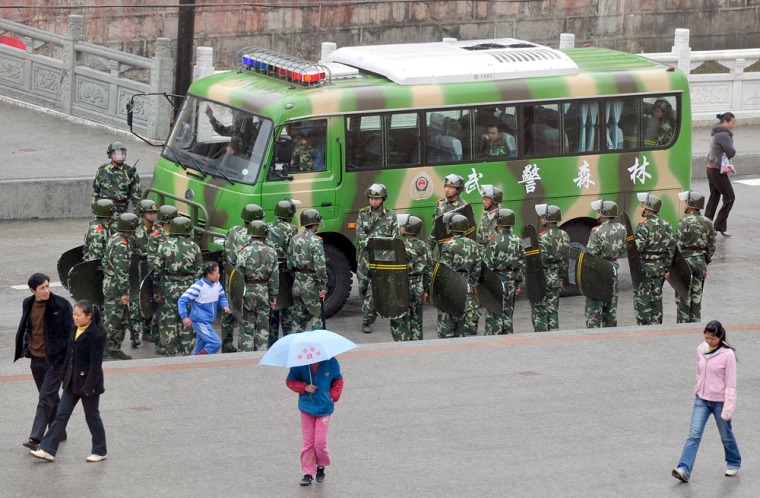The flagship newspaper of China's ruling Communist Party called Saturday for efforts to "resolutely crush" anti-government demonstrations by Tibetans, while Beijing urged people to turn in those on a "Most Wanted" list of 21 protesters.
As Chinese troops smothered Tibetan-heavy areas to avert additional unrest, U.S. presidential hopeful John McCain, a Republican, and House of Representatives Speaker Nancy Pelosi, a Democrat, joined a growing international chorus of criticism against the crackdown.
The protests, which started in Lhasa on the March 10 anniversary of a failed uprising against Chinese rule, turned violent four days later and touched off demonstrations among Tibetans in three other provinces.
The movement has become the largest challenge to China's control of Tibet since the 1959 uprising. It also has threatened Beijing's attempts to project an image of unity and prosperity ahead of the Aug. 8-24 Olympics.
Beijing's official death toll from last week's rioting in the Tibetan capital of Lhasa rose to 22, with the Xinhua News Agency reporting that five more civilians and a police officer died. The Tibetan government-in-exile has said 99 Tibetans have been killed _ 80 in Lhasa and 19 in Gansu province.
Beijing has portrayed the protests as having been instigated by supporters of the exiled Tibetan leader, the Dalai Lama.
'Evil intentions'
"We must see through the secessionist forces' evil intentions, uphold the banner of maintaining social stability ... and resolutely crush the 'Tibet independence' forces' conspiracy," the People's Daily said in an editorial.
During a visit to Paris on Friday, McCain, the presumptive Republican presidential nominee, said China's crackdown "is not correct" and expressed hope Beijing would seek a peaceful resolution.
"The people there are being subjected to mistreatment that is not acceptable with the conduct of a world power, which China is," McCain said in response to a question by a Chinese reporter.
"There must be respect for human rights, and I would hope that the Chinese are actively seeking a peaceful resolution to this situation that exists which harms not only the human rights of the people there but also the image of China in the world," he said.
The White House said Thursday the crackdown is not cause for President Bush to cancel his attendance at the Olympics. But it requested access to the region to see how Chinese police were dealing with detained protesters.
On Friday, Pelosi lent her support to the Tibetan cause on a visit to the Dalai Lama at his headquarters in India, calling China's crackdown "a challenge to the conscience of the world."
Pelosi, long a fierce critic of China, called for an international investigation and dismissed Beijing's claim that the Dalai Lama was behind the fighting as making "no sense." The Dalai Lama, who received the 1989 Nobel Peace Prize, says he does not seek independence but wants genuine autonomy to protect Tibet's unique Buddhist culture.
International support?
Fighting back against the rising criticism, Beijing has begun releasing tallies of statements of support from foreign governments and trying to get its version of events before the international community.
"It is a clear proof that the international community is on the side of China", foreign ministry spokesman Qin Gang said, according to Xinhua, which reported that 100 governments have endorsed China's handling of the protests.
Without mentioning Pelosi by name, Qin said China opposes "any encouragement and support for the secessionist schemes of the Dalai clique."
On Friday, authorities intensified a manhunt for people accused of violence, posting their photos -- taken from video cameras and security footage -- on major Internet portals.
The 21 people are accused of endangering national security, and cited for beating, smashing, looting and arson. One suspect was shown wielding a long sword and another was a mustached man who had been shown on news programs slashing another with a foot-long blade.
Xinhua said two of the 21 suspects were arrested and a third turned himself in. Authorities offered rewards for information and promised anonymity to tipsters.
Police have arrested 24 people and another 183 turned themselves in, Xinhua said.
Outside of Lhasa
Outside of Lhasa, Beijing has deployed troops across a wide swath of western China where more than half of China's 5.4 million Tibetans live. Moving from town to town, police set up blockades and checkpoints to keep Tibetans in and journalists out.
The mobilization was helping authorities reassert control after demonstrations flared in Sichuan, Qinghai and Gansu provinces, inspired by monks in Lhasa last week.
In Lhasa on Friday, residents said police patrolled the streets but people were free to go where they wanted as long as they had identity cards. In ethnic Tibetan areas of Sichuan and Gansu, residents said security forces set up armed encampments and hundreds of troops were patrolling towns.
State television, in its first footage of the confrontation between protesters and police last Sunday in the Tibetan town of Aba, showed dozens of crimson-robed monks charging at a line of police standing behind plastic riot shields. Crowds of ordinary people hurled rocks and one threw a molotov cocktail as cars burned in the town ringed by snow-peaked mountains.
Xinhua said earlier that police opened fire on the crowd, wounding four and that protesters tried to break into the police armory to steal weapons. Tibet support groups say police killed at least eight and posted photos of bloody corpses on the Internet.
